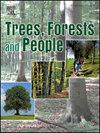Assessing the socio-psychological implications of Community Forest Resource (CFR) rights for forest-dwelling communities in Central India
IF 2.9
Q1 FORESTRY
引用次数: 0
Abstract
In India, the Forest Rights Act (2006) legally recognizes the land rights of forest-dependent and forest-dwelling communities by granting them decision-making power over the lands they have traditionally depended on. Through the Community Forest Resource (CFR) rights, a key provision under this Act, communities are entitled to protect biodiversity, manage forest produce, and participate in forest planning and decision-making in their customary lands. While CFR rights have been studied for their socio-economic and material outcomes, their socio-psychological implications remain relatively underexplored. We addressed this critical gap by using a combination of household interviews, focus group discussions, and narrative walks in three CFR-entitled villages in Vidarbha Maharashtra, India. Responses were transcribed and analyzed using value coding and descriptive statistics. An inductive approach guided the identification of key themes, followed by multiple rounds of interpretation situated within the context of CFR governance. The five key themes that emerged were satisfaction with CFR-based forest management, inclusion in decision-making, freedom to express opinions, values of environmental stewardship, and aspirations for empowered village futures. We found that CFR rights had positive socio-psychological implications for most respondents by fostering a greater sense of agency, belonging, inclusion, and empowerment in relation to forest governance. However, some respondents reported concerns about power asymmetries and limited representation. These findings suggest that policies need to move beyond procedural recognition of CFR rights to actively enable inclusive governance practices. Strengthening representation, supporting community-led stewardship, and addressing local power dynamics are essential for advancing both equity and effectiveness in CFR implementation.
评估印度中部森林居民社区森林资源(CFR)权利的社会心理影响
在印度,《森林权利法案》(2006年)在法律上承认依赖森林和居住在森林中的社区的土地权利,赋予他们对其传统上所依赖的土地的决策权。通过社区森林资源(CFR)权利(该法案的一项关键条款),社区有权保护生物多样性,管理森林产品,并在其习惯土地上参与森林规划和决策。虽然对CFR权利的社会经济和物质结果进行了研究,但对其社会心理影响的探索仍然相对不足。我们在印度马哈拉施特拉邦Vidarbha Maharashtra的三个乡村采用了家庭访谈、焦点小组讨论和叙事漫步相结合的方法来解决这一关键差距。使用数值编码和描述性统计对应答进行转录和分析。归纳方法指导了关键主题的确定,随后是位于CFR治理背景下的多轮解释。出现的五个关键主题是对基于cfr的森林管理的满意度、参与决策、表达意见的自由、环境管理的价值观以及对赋权村庄未来的渴望。我们发现CFR权利对大多数受访者具有积极的社会心理影响,通过培养与森林治理相关的更大的代理感、归属感、包容感和赋权感。然而,一些受访者对权力不对称和有限的代表性表示担忧。这些发现表明,政策需要超越对CFR权利的程序性承认,积极实现包容性治理实践。加强代表性,支持社区主导的管理,解决地方权力动态问题,对于促进CFR实施的公平性和有效性至关重要。
本文章由计算机程序翻译,如有差异,请以英文原文为准。
求助全文
约1分钟内获得全文
求助全文
来源期刊

Trees, Forests and People
Economics, Econometrics and Finance-Economics, Econometrics and Finance (miscellaneous)
CiteScore
4.30
自引率
7.40%
发文量
172
审稿时长
56 days
 求助内容:
求助内容: 应助结果提醒方式:
应助结果提醒方式:


